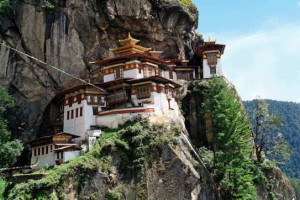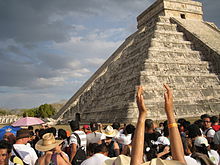Gross National Happiness in Bhutan: The price of authenticity in travel
With a billion people traveling the world each year, travelers must simply search harder to find true authenticity. Natural splendor has been compromised by heavy tourist footprints, and these heavy footprints have steered some of the world’s most beautiful places to the overdeveloped “endangered world heritage sights” list. Spend a day at Machu Picchu or Chichen Itza and you’ll see what I mean.
While the beauty of the world is something that should be shared, some countries are working hard to dissuade the stampeding tourist trail. Most governments have open door tourist policies, encouraging visitors and allowing for independent travel, but what happens when a country says “no” to becoming a victim of its own popularity?
The landlocked kingdom of Bhutan has turned itself into a traveler’s paradise, putting “purpose before profit” with their model of  Gross National Happiness over Gross National Product. Culture seekers (with thick wallets) rejoice, for Bhutan is truly a slice of unspoiled splendor, a place where tourism is woven into local life. Staged experiences are non-existant, and don’t expect to see throngs of bearded, beer guzzling backpackers traveling on a shoestring. The Bhutan tourism board promises that this controlled model will only continue to lure the “high value, low-impact” tourists and avoid a tourism free-for-all. Despite a record 40,000 foreign visitors in 2011, overdevelopment still seems unlikely. Nepal, on the other hand, served 800,000 visitors in 2011 with the help of their “Nepal Tourism Year” campaign. A walk around Kathmandu’s Thamel district will show you what Bhutan is trying to avoid.
Gross National Happiness over Gross National Product. Culture seekers (with thick wallets) rejoice, for Bhutan is truly a slice of unspoiled splendor, a place where tourism is woven into local life. Staged experiences are non-existant, and don’t expect to see throngs of bearded, beer guzzling backpackers traveling on a shoestring. The Bhutan tourism board promises that this controlled model will only continue to lure the “high value, low-impact” tourists and avoid a tourism free-for-all. Despite a record 40,000 foreign visitors in 2011, overdevelopment still seems unlikely. Nepal, on the other hand, served 800,000 visitors in 2011 with the help of their “Nepal Tourism Year” campaign. A walk around Kathmandu’s Thamel district will show you what Bhutan is trying to avoid.
So, what exactly does the country do to set itself apart? A visit to Bhutan comes with a heavy price tag, a price that thrill seeking budget travelers in neighboring countries are unlikely willing to pay. Visitors start by forking over $200 USD per day, a fee which covers accommodation, food, and tour guides. An additional $65 tax is used by the government to fund infrastructure, education, health and other programs. While there is no restriction on tourist numbers, all visits must be arranged through the an official tour operator and the hassle and cost of it all is enough to keep many visitors out of the country. Independent trekkers like those in neighboring Nepal aren’t praised, they’re arrested!
Bhutan may be losing out on tourism dollars, but the “GNH” phenomenon is attracting plenty of foreign attention. Is a trip to authentic Buddhist Bhutan worth the price tag? Do you think open tourism laws ruin any hope of authenticity?


May 9th, 2012 at 6:23 am
Is there such a thing as an ‘authentic’ travel experience. Wherever you go, whatever you do – from the mountains of Bhutan to a Las Vegas casino – it’s all authentic, isn’t it? Whether you wish to stay very long is a different matter. I’ve love to visit Bhutan if I had the budget, maybe one day – the ‘staged experiences’ you write about make me cringe and hide even if it is an ‘authentic’ staged experience.